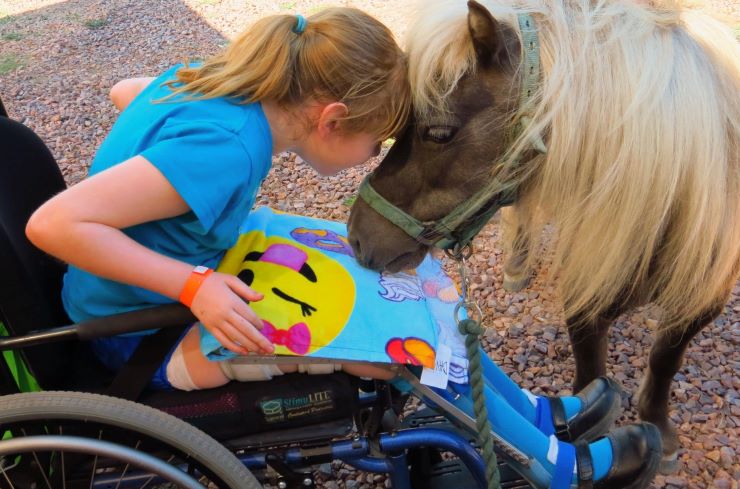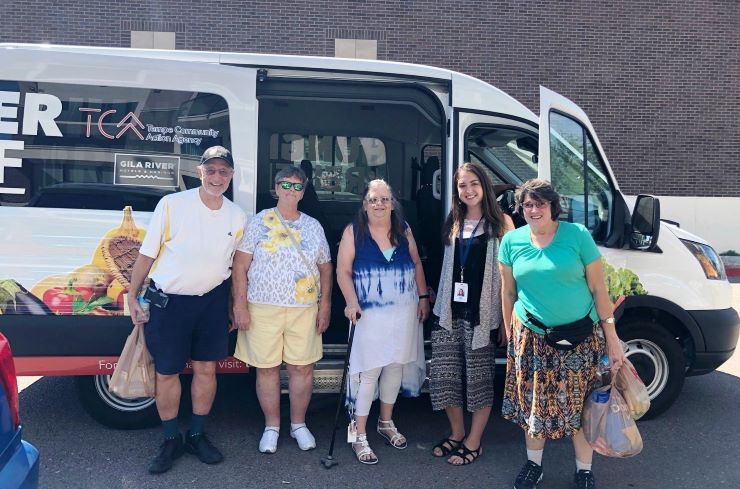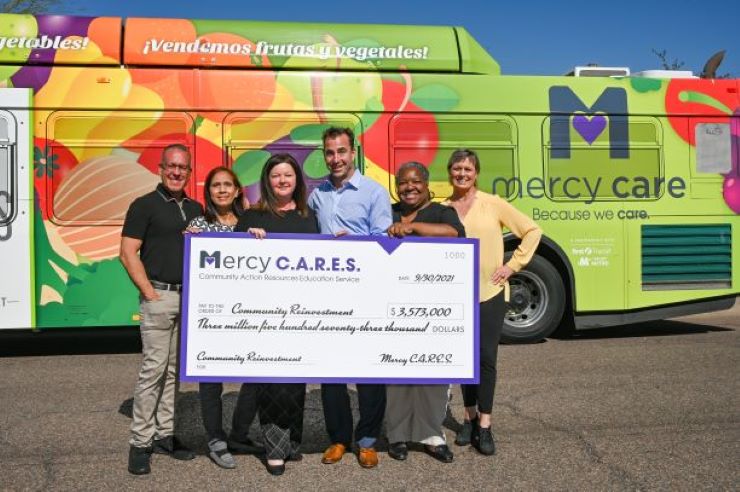Everyone deserves access to health care. Since 1985, Phoenix-based Mercy Care has worked to provide that access.
The not-for-profit Medicaid health plan serves AHCCCS members in Arizona, providing access to physical and behavioral health care services for Medicaid-eligible families, children, seniors and individuals with developmental/cognitive disabilities. In addition to its full scope of services and programs, Mercy Care also has its own community giving initiative, Mercy C.A.R.E.S., which stands for Community Action Resources Education and Service.
Through grant funding, sponsorships, volunteer efforts and board participation, Mercy C.A.R.E.S. supports AHCCCS’ Whole Person Care Initiative, which addresses Social Risk Factors to improve health outcomes.
Among the organizations who receive sponsorship support through Mercy C.A.R.E.S. is Special Olympics Arizona (SOAZ). Mercy Care’s partnership with SOAZ started with a $10,000 grant for the 2010-11 Summer Games. Since then, Mercy Care’s support has continued to grow, providing more than $225,000 in financial assistance. Through the support in recent years, SOAZ has been able to provide more than 12,100 free health screenings and trained more than 330 health professionals and students to educate and treat people with intellectual disabilities. Outside of the financial support, Mercy Care has also collectively volunteered than 3,400 hours with SOAZ.
Community Reinvestment Grants
“Through Mercy C.A.R.E.S., we provide grants to organizations that advance health equity and further our vision that everyone, particularly those who are underserved with complex health needs, deserves to live a healthier life, and achieve their full potential,” says Trisha Stuart, Mercy Care director of community relations. “Since 2016, the Mercy C.A.R.E.S. Community Reinvestment grant program has invested nearly $15 million in local organizations.”
The grants typically range from $20,000 to $500,000 and are awarded to strategic projects, with measurable outcomes, that demonstrate tangible, positive impact to the community. They align with one or more of Mercy Care’s community health focus areas, including managing chronic conditions and supporting mental health.
The programs supported through a Mercy C.A.R.E.S. Community Reinvestment grant are far-reaching, impacting individuals across Arizona. As the organization prepares to announce its 2023 grantees later this year, here is a look at just some of the 2022 grant recipients and their impactful work across Arizona.

Dementia Capable Southern Arizona Memory Cafés
Memory Cafés through Dementia Capable Southern Arizona, anchored at Pima Council on Aging (PCOA), launched in 2021 amid COVID-19.
“When explaining to people what these cafés are, we first like to talk about what they are not,” says Program Director Harbhajan Khalsa. “They are not support groups. They are not medical visits. They are not a respite for caregivers. They are a space for connection.” According to Khalsa, memory cafés are a safe space for socialization and community, both for those living with dementia and their families.
“We want our participants to leave their diagnosis at the door and come together to create connections with others, all while in a safe space surrounded by others with similar experiences as well as professionals that are trained to help should anything come up. Individuals experiencing memory loss often become isolated and lonely, as do their caregivers, so these cafés are critical to so many of our social and emotional needs,” says Khalsa.
There is no cost to attend a café, and PCOA does not require proof of diagnosis. Currently, there are two Memory Cafés through Dementia Capable Southern Arizona: one at La Posada Green Valley and one at The Katie Dusenberry Healthy Aging Center. Both offer light snacks, drinks, music, and sometimes third-party entertainment, ranging from speakers to musicians.
“We host the cafés once or twice a month, but they have grown so quickly that we have been working hard to expand. The Mercy C.A.R.E.S. grant will allow us to open two additional locations with partners over the next six months,” says Khalsa.
Whispering Hope Ranch Foundation
Whispering Hope Ranch Foundation, which provides hope and healing to children with special needs through inclusive camp experiences, was awarded a Mercy C.A.R.E.S. Community Reinvestment grant to support the purchase of adaptive equipment and fund animal care for the organization’s Nature’s Nurses program.
“Nature’s Nurses brings together children and animals living with disabilities or illnesses for thoughtful interaction during the normal course of our camp programming,” says Mary Clark, executive director for Whispering Hope Ranch Foundation. “Our goal through this program is to give our campers a sense of belonging to a community and enhance well-being during and after their week-long camp session.”
According to Clark, animal interaction and equine-facilitated programs have a wide range of benefits for children with special needs.
“Since opening our doors in 1999, we have provided a safe, fun, and therapeutic respite for children living with any medical, physical, developmental, or emotional disability. Nature’s Nurses is the heart of the Ranch experience and a critical reason for our continued impact,” says Clark. “Through this grant, Whispering Hope will be able to ensure that the healing that happens between campers and our gentle animal residents continues for years to come.”

Valleywise Health Foundation
Valleywise Health Foundation, the 501(c)(3) nonprofit supporting Valleywise Health, Arizona’s public teaching health system, was awarded a Mercy C.A.R.E.S. Community Reinvestment grant to support its Cultural Health Navigators at Valleywise Health’s Refugee Women’s Health Clinic. Over a two-year period, this grant will be used to help bridge cultural gaps and improve patient outcomes.
Since its inception in 2008, the Refugee Women’s Health Clinic has been a medical home to more than 5,000 individual patients from 71 different countries speaking 67 different languages. Cultural Health Navigators are the cornerstone of the program’s success. From assisting refugees with navigating the health system by accompanying them to medical visits, providing interpretation and transportation services, and offering home visits, Cultural Health Navigators play a critical role in establishing trust and educating families.
“Support for Cultural Health Navigators provided by the Mercy C.A.R.E.S. grant will assist our Refugee Health Services team to provide the culturally sensitive clinical care needed most by families starting a new life,” says Dr. Michael White, Valleywise Health chief clinical officer “These Navigators are an invaluable part of our refugee care team, working to reduce health inequities and cultural barriers to care.”
As one of the top 10 refugee resettlement states in the U.S., Arizona has become home for more than 75,000 refugees since 1975. An average of 4,000 refugees are resettled in Arizona annually.
Neighbors Helping Neighbors
Neighbors Helping Neighbors helps vulnerable older adults in Tempe by addressing barriers that impact their ability to remain independent at home as they grow older including poverty, food insecurity, chronic health issues and mobility limitations, and isolation or loneliness.
The program, according to Tempe Community Action Agency Director of Development Megan Wilson, is based on the national “Village” concept, which trains neighbors to be volunteer aides for older adults who lack support networks so they can remain safely in the home and community they love as they age. It provides resource navigation, home visits, access to nutritious meals and food boxes, AHCCCS and SNAP enrollment assistance, transportation, care for pets, light home and yard upkeep, and social support for a growing population of older adults who lack the finances and safety net to live independently as they age.
“There are no other programs in Tempe that offer free comprehensive in-home services for low-income, aging adults, making Neighbors Helping Neighbors unique and unduplicated in our community,” says Wilson. “In addition, we have found that 80 percent of participants report the support provided by the program helps them to continue to live independently.”
According to Wilson, its Mercy C.A.R.E.S. grant will directly support 150 older adults in Tempe, 30 of whom will receive a Claris Companion Tablet, internet access, and accompanying training by case managers, with the goal to reduce their feelings of isolation, loneliness, and depression through connectivity.
For more information on Mercy C.A.R.E.S., visit www.mercycareaz.org.

